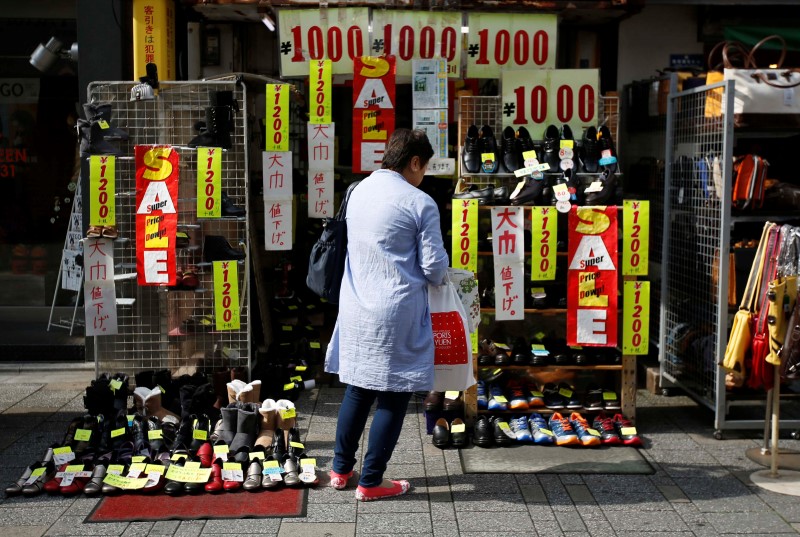(Bloomberg) -- Japan’s long-ruling Liberal Democratic Party is heading into Sunday’s upper house election burdened with an unpopular sales tax hike plan, a divisive bid to change the pacifist constitution and a black mark for fueling public unease over the pension system.
It’s expected to win hands down.
The country’s fragmented opposition has consistently failed to take advantage of cabinet scandals, gaffes and a security agenda that has sometimes sparked voter anger. As a result, almost seven years after Prime Minister Shinzo Abe returned to office, he is set to win his sixth straight national election victory and become the country’s longest-serving premier come November.
It’s a phenomenon that has even some members of the LDP lamenting the lack of competition. “Even though we’re going into the election calling for a tax increase, the LDP is in pretty good shape. This is incomprehensible,” said Shigeharu Aoyama, an upper house lawmaker from the ruling party. “It’s not healthy at all.”
Opposition parties are campaigning on popular pocketbook issues they say will ensure financial stability for families, trying to capitalize on public support for canceling Abe’s planned October sales tax increase. Abe is promising stability, strength and the status quo, which seems to be a winning formula.
The LDP-led block is expected to take at least 70 of the 124 upper house seats up for grabs, a Kyodo News poll released this week showed. The party has controlled the lower house, and thus the government, for all but four of the past 64 years.
“There are various parties in opposition now, but they can’t present a unified front,” said Mieko Nakabayashi, a former lawmaker with the Democratic Party of Japan, which a decade ago was the last opposition group to seize power from the LDP. “That means it’s hard for them to win elections. The public doesn’t look at this favorably,” said the lawmaker turned politics professor at Waseda University.
For example, voters in Tokyo will not only have a choice between the LDP, its coalition partner Komeito and the two halves of the former DPJ -- the Constitutional Democratic Party and the Democratic Party for the People -- but a total of 20 candidates from about a dozen different parties and groups.
Changing Times
Back in 2009, the DPJ ejected an LDP that voters saw as out of touch, sparking hopes that a two-party system could take root. But the government’s support rate tumbled to about 13% after the 2011 earthquake, tsunami and nuclear disaster that left about 20,000 people dead or missing, with reasons cited by respondents being distrust of its statements on the nuclear crisis and the party’s political infighting.
A crushing election defeat in 2012 stopped the Democrats’ advance and they were returned to the political wilderness, where they’ve remained ever since. To make matters worse, a 2017 attempt to oust Abe by Tokyo Governor Yuriko Koike ended up splitting the DPJ into two parties that have shown no sign of reunifying.
Meanwhile, a buoyant jobs market has helped shield Abe from complaints about his administration, which has been able to end a deflationary spiral in the world’s third-largest economy through unprecedented monetary easing and government spending. He’s also managed to maintain the LDP’s traditional close relations with the U.S. -- Japan’s sole security guarantor -- despite occasional criticism from President Donald Trump.
Asked which party they supported, 45% of respondents to a poll carried out by the Asahi newspaper July 13-14 said they didn’t know or didn’t favor any. While the LDP had 34% support, no other party scored more than 6%.
“If the LDP wins every time, there will be no checks on it,” said Yu Uchiyama, a professor of politics at the University of Tokyo. The remnants of the DPJ “should work together to oppose the LDP,” he added.
Faltering Fortunes
The career of Kuniko Koda, who won election to the upper house as a member of the then-rapidly rising opposition DPJ in 2007, traces the party’s faltering fortunes. She left the DPJ before its defeat in 2012 and later joined Koike’s Party of Hope.
This month, she is leaving national politics in favor of a campaign to become governor of Saitama prefecture, bordering Tokyo. She will be running as an independent. Koda said DPJ leaders lacked a determination to keep the party in power and failed to take responsibility for their mistakes by handing over to a new generation.
“We need another major party that can take over from the LDP as the party of government,” Koda said in an interview at her campaign office in Saitama. “The diplomacy and national security policies should be the same, but it should be capable of quick reforms to meet the needs of the time.”
While an upper house election doesn’t lead to a change in regime, an opposition majority can delay the government’s agenda. The main question for Abe this Sunday is whether he can win the two-thirds’ majority needed to order a national referendum on his plan to revise the pacifist constitution.
That such a milestone is within reach is a sign of how voters are opting for stability. Abe has prided himself on managing the economy, but even the prospect of a downturn is unlikely to convince voters to switch allegiance, said Nakabayashi, the former DPJ lawmaker.
“If the voters become dissatisfied with the administration, the only other option is the opposition parties. But they are not showing they have the capacity to run the government,” she said. “Voters feel nothing good will come from having the opposition take over.”
